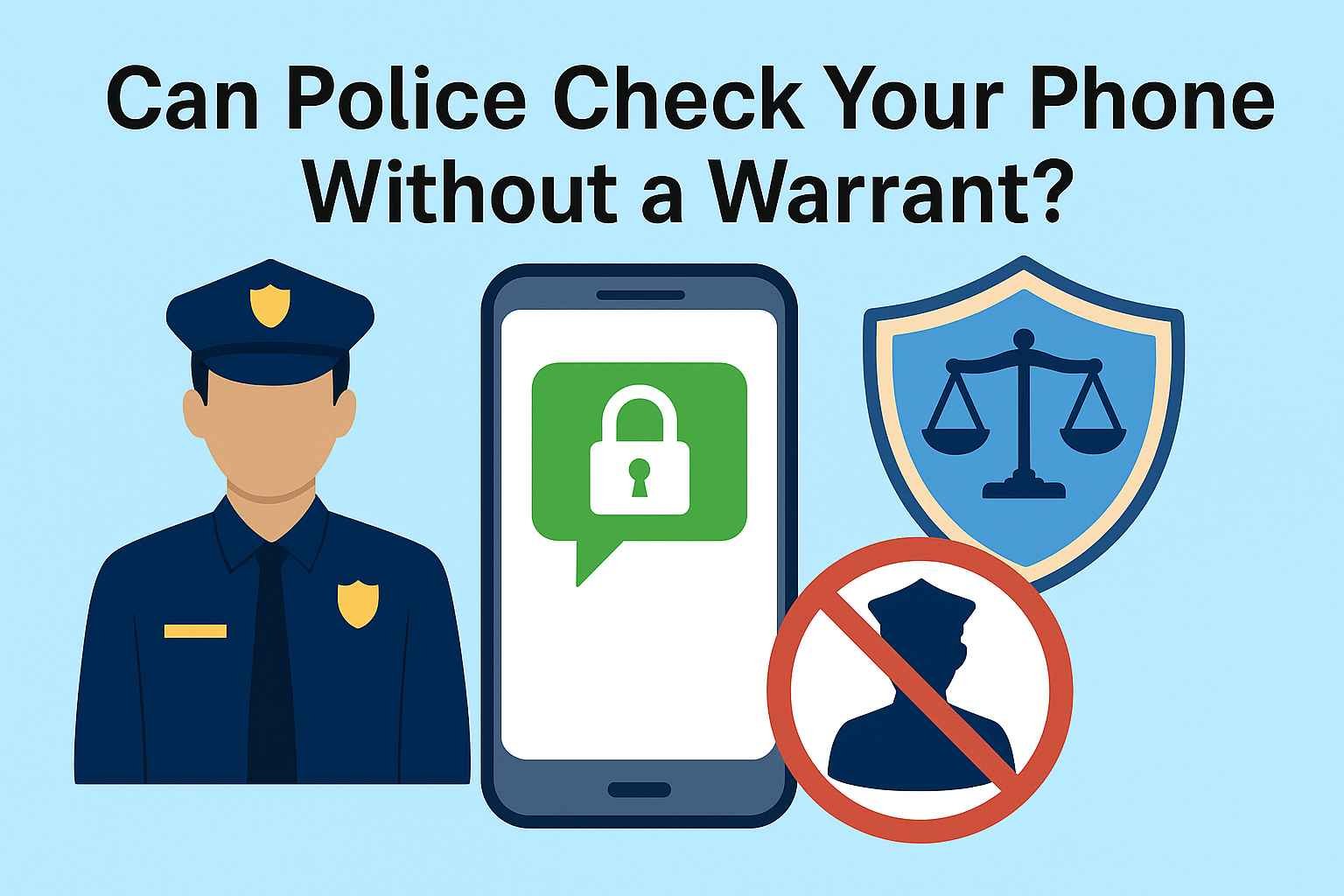On this page you will read detailed information about Can Police Check Your Phone Without a Warrant?
Introduction
Smartphones contain a trove of personal data—photos, messages, apps, location history, private communications. So when law enforcement seeks to access your phone, it raises crucial questions about privacy and legal limits.
The answer to “can police check your phone without a warrant?” depends heavily on where you are, what laws apply, whether you consent, or whether exigent circumstances exist. In 2025, both technology and jurisprudence have evolved, making this a complex issue.
In this blog, we’ll explore:
- Legal standards in India and abroad
- Landmark decisions and constitutional principles
- Common exceptions and tactics used by police
- Risks for individuals
- Practical advice to protect your rights
Legal Principles: Warrant, Consent, and Exceptions
The Warrant as the Gold Standard
A warrant (or judicial authorization) is the traditional legal tool police need to search private property, including digital content, to ensure checks and balances. A warrant typically requires:
- Probable cause or reasonable suspicion
- Affidavit or sworn statement
- Judge’s approval
- Defined scope (what’s being searched or seized)
In jurisdictions like the U.S., the Supreme Court in Riley v. California (2014) held that police generally must obtain a warrant before searching digital contents of a seized cell phone.
In short: a smartphone is not like a physical pocket or wallet. The vast amounts of personal, sensitive data demand protection from broad warrantless searches.
The Indian Scenario: Mixed Law & Unsettled Issues
Statutory Landscape & Recent Reform
- India replaced the Code of Criminal Procedure (CrPC) with Bharatiya Nagarik Suraksha Sanhita (BNSS), effective 1 July 2024. BNSS includes updated procedural rules for search, seizure, and safeguards.
- Traditional provisions under CrPC (e.g. Sections 93, 100) allowed police to obtain search warrants in certain conditions.
- The existing laws did not specifically govern digital devices. Thus police often treat phones as seized “things” under general search/seizure powers.
- In the absence of specific rules, courts and commentators have called for guidelines or statutory reform to regulate police searches of phones/devices.
Court Challenges & Media Petitions
- Journalist groups (FMP) have petitioned India’s Supreme Court to mandate that police must obtain a warrant to search electronic devices, requiring specific disclosure and proportionality in warrants.
- The Supreme Court has taken notice of the issue: existing laws do not clearly regulate how police may search devices, which risks violating the right to privacy.
- The state of jurisprudence is evolving; courts sometimes recognize that enforcing certain privacy safeguards is essential in digital investigations.
What Police Can Do Under Current Indian Practice
- Seizure of the device (without full search)
- Police may confiscate your phone as evidence or to preserve material. Courts have accepted this in many cases.
- When seizing, they should record hash values or create digital fingerprints to prevent tampering. Indian media and legal commentary assert that hash-creation is increasingly expected.
- Search under exigent or exceptional circumstances
- In emergencies (e.g. imminent danger, risk of evidence destruction), police may perform a limited search without warrant—but this is contested and must be justified.
- Under BNSS (or prior CrPC), some sections (like Section 165 in CrPC) allow warrantless entry/search to prevent escape or imminent destruction of evidence.
- But the extension to full data examination is controversial and not clearly permitted.
- Compelling unlocking / passwords
- Whether police can force you to decrypt or unlock your phone is legally sensitive and tied to self-incrimination principles. Some argue such compulsion violates rights.
- Courts have not universally settled this; many accept that compelling a suspect to reveal a password is questionable under privilege against self-incrimination.
- Lawyers also note that obtaining the password is qualitatively different from seizing the device itself.
Exceptions & Theoretical Justifications
Even in jurisdictions where warrant is generally needed, some doctrine exceptions exist:
- Search incident to arrest: A limited search of the suspect or immediate surroundings (for officer safety, preserving evidence). But in digital cases this is constrained (as in Riley case).
- Exigent circumstances: When waiting for a warrant would cause irreparable harm (evidence deletion, life threat).
- Consent: If you voluntarily and knowingly consent to a search, police may proceed without a warrant—but consent must be free and informed.
- Border or customs exceptions (in some countries): Authorities may have broader powers to inspect electronic devices at borders.
- Plain view doctrine: If the police see incriminating content in plain view while lawfully accessing part of device or screen—though its application to digital devices is limited.
These exceptions are narrowly construed and often litigated in court.
Key International Precedents & Comparisons
- United States (Riley v. California, 2014): The Supreme Court held that police must get a warrant before searching digital contents of a cell phone, even after arrest.
- Many U.S. jurisdictions also require warrant or judicial oversight, except in narrow emergencies.
- Some countries have “data protection” laws or judicial oversight regimes that specifically regulate police digital searches—but India lacks a comprehensive statute on device search yet.
These comparisons illustrate how legal systems are grappling with digital privacy globally.
In the previous post, we had shared information about Can You Play Loud Music at Night in India? Legal Rules Explained, so read that post also.
Risks & Realities for Individuals
- If police check your phone without legitimate legal authority, evidence found can be challenged or suppressed in court.
- Unlawful searches damage trust, civil liberties, and expose sensitive personal or professional data.
- You may inadvertently waive rights or consent under pressure.
- Random or arbitrary phone checks (without cause) are generally not lawful—some legal commentary says Section 91 (CrPC or BNSS equivalent) does not authorize random phone checks.
What You Should Do: Best Practices
- Know your rights quietly and calmly
- You can politely ask, “Do you have a warrant?”
- Do not physically resist an officer, but you can assert your constitutional/ legal rights.
- Refuse consent to search
- Unless you are confident the search is lawful, better to withhold consent.
- Statement like “I do not consent to a search without a court order” can help your case in court.
- Don’t unlock or decrypt voluntarily
- Declining to provide your password is defensible pending stronger legal clarity.
- Document everything
- If possible, record the encounter (if lawful in your jurisdiction).
- Note badge numbers, time, location, witnesses, and what was done.
- Legal challenge and motion to suppress evidence
- If data was seized unlawfully, you can file a motion in court to exclude that evidence.
What to Watch Ahead in India
- Supreme Court rulings mandating warrant requirements or procedural safeguards for device searches.
- Legislative reform to explicitly regulate digital search & seizure under BNSS or other statutes.
- Guidelines from courts or judiciary, prescribing how police may handle phones (hashing, sealed containers, limited access).
- Technology-specific rules for decryption, forensic extraction, cloud data, and remote wiping.
Conclusion
So, can police check your phone without a warrant? The short answer: not legally, in most circumstances—unless you consent or exceptional conditions apply. In India, the law is still catching up: phones are often treated like physical “things” under old search statutes, but smart devices demand more protection under privacy principles.
As courts and laws evolve, the balance between law enforcement and individual privacy will become clearer. Until then, knowing your rights, withholding consent, seeking legal support, and challenging unlawful searches are your best guards.
Disclaimer
The information and services on this website are not intended to and shall not be used as legal advice. You should consult a Legal Professional for any legal or solicited advice. While we have good faith and our own independent research to every information listed on the website and do our best to ensure that the data provided is accurate. However, we do not guarantee the information provided is accurate and make no representation or warranty of any kind, express or implied, regarding the accuracy, adequacy, validity, reliability, availability, or completeness of any information on the Site. UNDER NO CIRCUMSTANCES SHALL WE HAVE ANY LIABILITY TO YOU FOR ANY LOSS OR DAMAGE OF ANY KIND INCURRED AS A RESULT OR RELIANCE ON ANY INFORMATION PROVIDED ON THE SITE. YOUR USE OF THE SITE AND YOUR RELIANCE ON ANY INFORMATION ON THE SITE IS SOLELY AT YOUR OWN RISK. Comments on this website are the sole responsibility of their writers so the accuracy, completeness, veracity, honesty, factuality and politeness of comments are not guaranteed.
So friends, today we talked about Can Police Check Your Phone Without a Warrant?, hope you liked our post.
If you liked the information about Can Police Check Your Phone Without a Warrant?, then definitely share this article with your friends.
Knowing about laws can make you feel super smart ! If you find value in the content you may consider joining our not for profit Legal Community ! You can ask unlimited questions on WhatsApp and get answers. You can DM or send your name & number to 8208309918 on WhatsApp










